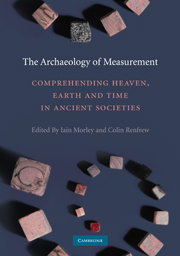Book contents
- Frontmatter
- Contents
- List of figures and tables
- List of contributors
- Acknowledgements
- The Archaeology of Measurement
- Introduction: Measure: Towards the construction of our world
- SECTION I NUMBER: COUNTING, MATHEMATICS AND MEASURE
- 1 Conceptualising quantification before settlement: Activities and issues underlying the conception and use of measurement
- 2 Measurement in navigation: Conceiving distance and time in the Neolithic
- 3 The token system of the ancient Near East: Its role in counting, writing, the economy and cognition
- 4 Grasping the concept of number: How did the sapient mind move beyond approximation?
- 5 Numerical cognition and the development of ‘zero’ in Mesoamerica
- 6 Recording measure(ment)s in the Inka khipu
- SECTION II MATERIALISING THE ECONOMY
- SECTION III DIMENSIONS AND BELIEF
- SECTION IV CALENDAR AND COSMOLOGY
- SECTION V THE SPIRITUALITY OF MEASURE
- Index
- References
5 - Numerical cognition and the development of ‘zero’ in Mesoamerica
Published online by Cambridge University Press: 05 June 2012
- Frontmatter
- Contents
- List of figures and tables
- List of contributors
- Acknowledgements
- The Archaeology of Measurement
- Introduction: Measure: Towards the construction of our world
- SECTION I NUMBER: COUNTING, MATHEMATICS AND MEASURE
- 1 Conceptualising quantification before settlement: Activities and issues underlying the conception and use of measurement
- 2 Measurement in navigation: Conceiving distance and time in the Neolithic
- 3 The token system of the ancient Near East: Its role in counting, writing, the economy and cognition
- 4 Grasping the concept of number: How did the sapient mind move beyond approximation?
- 5 Numerical cognition and the development of ‘zero’ in Mesoamerica
- 6 Recording measure(ment)s in the Inka khipu
- SECTION II MATERIALISING THE ECONOMY
- SECTION III DIMENSIONS AND BELIEF
- SECTION IV CALENDAR AND COSMOLOGY
- SECTION V THE SPIRITUALITY OF MEASURE
- Index
- References
Summary
Part I. Numeration and numerical cognition
Cognition is a system consisting of representations of knowledge together with the processes that operate on those representations. What is fundamental to numerical cognition is the representation of knowledge about number and numeration, and the operations that are performed on them. This section explores features of numeral systems that relate to several different perspectives on these matters within cognitive and linguistic anthropology. It begins with a selection from Greenberg's (1987) findings on cross-linguistic regularities in the structure of numeral systems in spoken languages.
Number words and phrases
One way to explore how number is conceived is through its representation in language. For many linguistic anthropologists, it seems almost inevitable that the grammatical structure of words relating to regularly relevant semantic categories and domains will help to shape and/or be shaped by the ways they process information involving those categories and domains. Whether or not this is so in the case of number, the relevance of its linguistic representation follows from two empirical observations. (1) The vast majority of languages have numerals – conventional terms used widely in a speech community to represent specific numbers. (2) Worldwide, numeral systems – the linguistic organizations of terms representing numbers – show great similarity in their basic structure. The major work relevant to this chapter is by Greenberg (1987; see also Stampe 1977, Hurford 1987), who provides 54 generalizations capturing the structures of a wide variety of documented numeral systems.
Information
- Type
- Chapter
- Information
- The Archaeology of MeasurementComprehending Heaven, Earth and Time in Ancient Societies, pp. 43 - 53Publisher: Cambridge University PressPrint publication year: 2010
References
Accessibility standard: Unknown
Why this information is here
This section outlines the accessibility features of this content - including support for screen readers, full keyboard navigation and high-contrast display options. This may not be relevant for you.Accessibility Information
- 4
- Cited by
